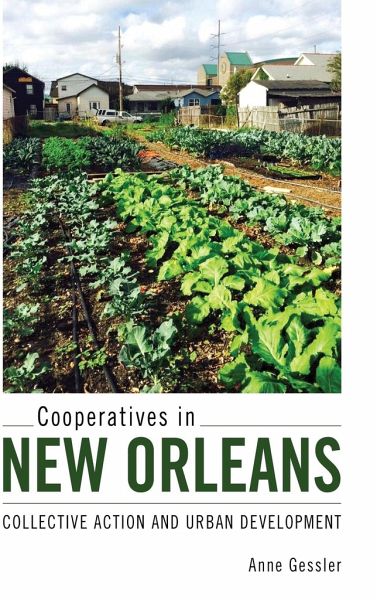
Cooperatives in New Orleans
Collective Action and Urban Development
Versandkostenfrei!
Versandfertig in 1-2 Wochen
112,99 €
inkl. MwSt.
Weitere Ausgaben:

PAYBACK Punkte
56 °P sammeln!
Cooperatives have been central to the development of New Orleans. Anne Gessler asserts that local cooperatives have reshaped its built environment by changing where people interact and with whom, helping them collapse social hierarchies and envision new political systems. Gessler tracks many neighborhood cooperatives, spanning from the 1890s to the present, whose alliances with union, consumer, and social justice activists animated successive generations of regional networks and stimulated urban growth in New Orleans. Studying alternative forms of social organization within the city's multiple...
Cooperatives have been central to the development of New Orleans. Anne Gessler asserts that local cooperatives have reshaped its built environment by changing where people interact and with whom, helping them collapse social hierarchies and envision new political systems. Gessler tracks many neighborhood cooperatives, spanning from the 1890s to the present, whose alliances with union, consumer, and social justice activists animated successive generations of regional networks and stimulated urban growth in New Orleans. Studying alternative forms of social organization within the city's multiple integrated spaces, women, people of color, and laborers blended neighborhood-based African, Caribbean, and European communal activism with international cooperative principles to democratize exploitative systems of consumption, production, and exchange. From utopian socialist workers' unions and Rochdale grocery stores to black liberationist theater collectives and community gardens, these cooperative entities integrated marginalized residents into democratic governance while equally distributing profits among members. Besides economic development, neighborhood cooperatives participated in heady debates over urban land use, applying egalitarian cooperative principles to modernize New Orleans's crumbling infrastructure, monopolistic food distribution systems, and spotty welfare programs. As Gessler indicates, cooperative activists deployed street-level subsistence tactics to mobilize continual waves of ordinary people seizing control over mainstream economic and political institutions.




![Account of the Voyage of the Ursulines to New Orleans in 1727 [microform] Cover Account of the Voyage of the Ursulines to New Orleans in 1727 [microform]](https://bilder.buecher.de/produkte/71/71658/71658649n.jpg)








